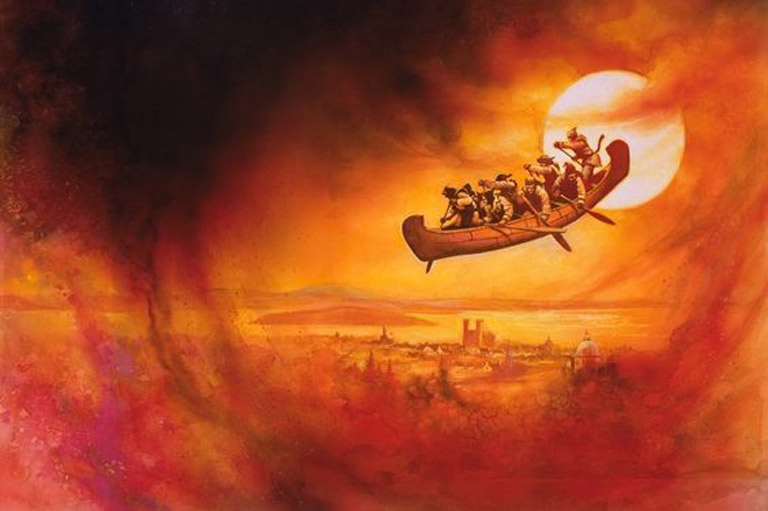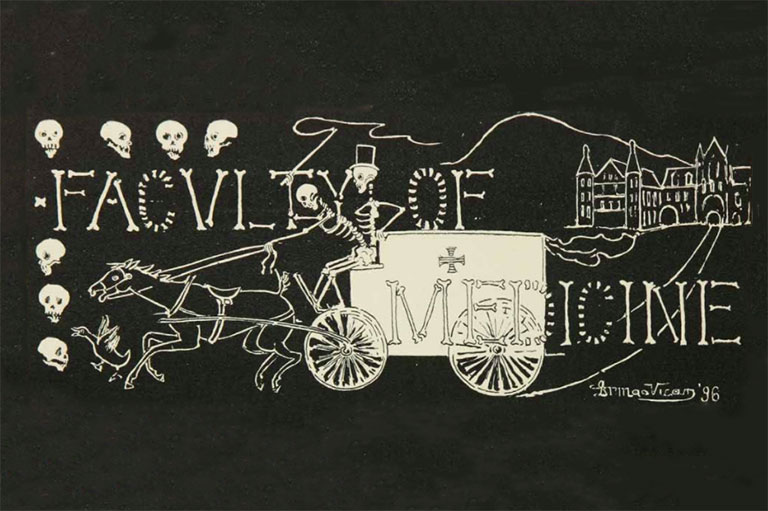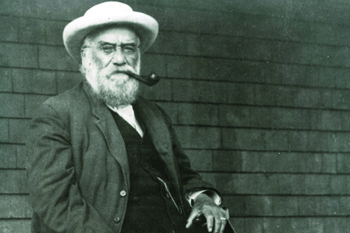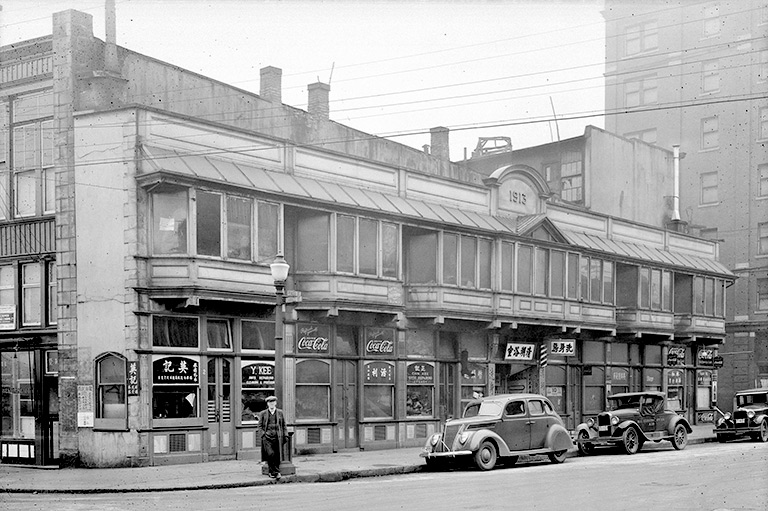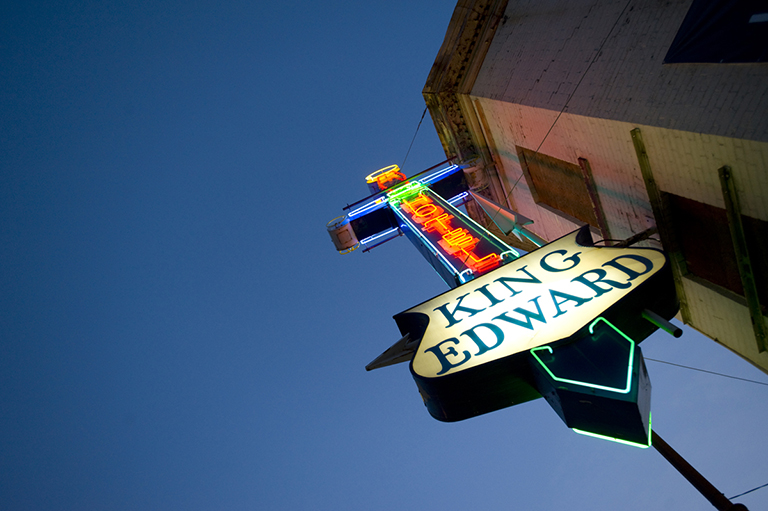Haunted History
-
 Brewing beyond the grave. Legend has it that after Alexander Keith died in 1873 his spirit stayed on to keep a close eye on the brewery's operations.Illustration by GMB Chomichuk
Brewing beyond the grave. Legend has it that after Alexander Keith died in 1873 his spirit stayed on to keep a close eye on the brewery's operations.Illustration by GMB Chomichuk -
 A spectre at your service. Sam McAuley was a lifelong employee of the Fairmont Banff Springs who loved the hotel and his job.Illustration by GMB Chomichuk
A spectre at your service. Sam McAuley was a lifelong employee of the Fairmont Banff Springs who loved the hotel and his job.Illustration by GMB Chomichuk -
 Staff of the Fairmont Banff Springs in 1963. McAuley, seated in the centre, has reputedly been haunting the hotel since his death in 1976.Courtesy of Fairmont Banff Springs
Staff of the Fairmont Banff Springs in 1963. McAuley, seated in the centre, has reputedly been haunting the hotel since his death in 1976.Courtesy of Fairmont Banff Springs -
 Fancy footwork frightens visitors at the Bytown Museum. In 1827 the building held supplies for the construction of the Rideau Canal.Illustration by GMB Chomichuk
Fancy footwork frightens visitors at the Bytown Museum. In 1827 the building held supplies for the construction of the Rideau Canal.Illustration by GMB Chomichuk -
 The strange footsteps that people hear is supposedly Duncan McNab, one of the supply managers for the canal project. His job was to protect the valuables used to pay staff and contractors.Courtesy of Bytown Museum
The strange footsteps that people hear is supposedly Duncan McNab, one of the supply managers for the canal project. His job was to protect the valuables used to pay staff and contractors.Courtesy of Bytown Museum -
 The "Burning Bride." A 1930s-era bride whose wedding dress train brushed against a candle and caught on fire, causing her to fall down the stairs and break her neck.Illustration by GMB Chomichuk
The "Burning Bride." A 1930s-era bride whose wedding dress train brushed against a candle and caught on fire, causing her to fall down the stairs and break her neck.Illustration by GMB Chomichuk -
 The "Burning Bride" has been seen on this staircase at the Fairmont Banff Springs Hotel.Courtesy of Fairmont Banff Springs
The "Burning Bride" has been seen on this staircase at the Fairmont Banff Springs Hotel.Courtesy of Fairmont Banff Springs -
 Ghost soldiers on the plains of Abraham. Visitors have reported seeing apparitions of soldiers advancing on the field with muskets.Illustration by GMB Chomichuk
Ghost soldiers on the plains of Abraham. Visitors have reported seeing apparitions of soldiers advancing on the field with muskets.Illustration by GMB Chomichuk -
 "Lady in Red" spooks guests. Twenty-five-year-old Jennie "Pearl" Cox loved to dance at the Fairmont Hotel Vancouver. After dying in a 1944 car accident, she reputedly chose to haunt the hotel she loved so much.Illustration by GMB Chomichuk
"Lady in Red" spooks guests. Twenty-five-year-old Jennie "Pearl" Cox loved to dance at the Fairmont Hotel Vancouver. After dying in a 1944 car accident, she reputedly chose to haunt the hotel she loved so much.Illustration by GMB Chomichuk -
 Polly want a stiff drink? The Caribou Hotel in the Yukon is haunted by the ghost of Bessie Gideon and her parrot.Illustration by GMB Chomichuk
Polly want a stiff drink? The Caribou Hotel in the Yukon is haunted by the ghost of Bessie Gideon and her parrot.Illustration by GMB Chomichuk -
 In 1918 Bessie Gideon was asked to take care of the parrot by a guest who died shortly afterwards. Gideon is pictured fourth from the left.Courtesy of Caribou Hotel
In 1918 Bessie Gideon was asked to take care of the parrot by a guest who died shortly afterwards. Gideon is pictured fourth from the left.Courtesy of Caribou Hotel -
 Rebel in a frock coat... could it be William Lyon Mackenzie?Illustration by GMB Chomichuk
Rebel in a frock coat... could it be William Lyon Mackenzie?Illustration by GMB Chomichuk -
 Mackenzie House in Toronto is said to be haunted by William Lyon Mackenzie, but a dark-haired woman has also been sighted.Courtesy of James Careless
Mackenzie House in Toronto is said to be haunted by William Lyon Mackenzie, but a dark-haired woman has also been sighted.Courtesy of James Careless -
 The ghosts of Signal Hill include a mother mourning the loss of her baby.Illustration by GMB Chomichuk
The ghosts of Signal Hill include a mother mourning the loss of her baby.Illustration by GMB Chomichuk -
 Spirits on the move. Several houses in Calgary's Heritage Park Historical Village have been the scenes of ghostly apparitions, moving objects and slamming doors.Illustration by GMB Chomichuk
Spirits on the move. Several houses in Calgary's Heritage Park Historical Village have been the scenes of ghostly apparitions, moving objects and slamming doors.Illustration by GMB Chomichuk -
 Disaster victims haunt restaurant that used to be the funeral home that handled the fatalities from the Titanic and the Halifax Explosion.Illustration by GMB Chomichuk
Disaster victims haunt restaurant that used to be the funeral home that handled the fatalities from the Titanic and the Halifax Explosion.Illustration by GMB Chomichuk -
 Victims of the Titanic sinking are among those who supposedly haunt the Five Fishermen Restaurant in Halifax.Courtesy of Five Fishermen Restaurant
Victims of the Titanic sinking are among those who supposedly haunt the Five Fishermen Restaurant in Halifax.Courtesy of Five Fishermen Restaurant
From helpful bellhops, to burning brides, to things that go bump in the night, places of historic interest are often linked to spine-tingling tales of the supernatural. Old hotels, heritage homes, long-running businesses, and other storied sites are as likely as not to be “haunted” — or so it is claimed. Today almost every Canadian city has at least one ghost tour operator who does a thriving business scaring people out of their wits.
Curiosity about odd and unexplainable happenings is not new. In the 1920s interest in spiritualism — communicating with the dead — reached a peak, with séances held in the drawing rooms of respectable citizens on both sides of the Atlantic. In Winnipeg, for example, Dr. Thomas Hamilton and his wife Lillian conducted séances attended by such luminaries as Prime Minister William Lyon Mackenzie King and Sir Arthur Conan Doyle. But skeptics such as magician Harry Houdini dismissed the spiritualism craze, saying the mediums were taking advantage of peoples’ grief over the loss of life in the trenches of the First World War.
Advertisement
Ghost sightings have had a long history in all human cultures. Believers have generally understood them to be the deceased. Others have looked to science for explanations. Back in 1813, Scottish physician John Ferriar wrote An Essay Towards a Theory of Apparitions which argued that ghosts were actually optical illusions. Another physician, Alexandre Jacques François Brière de Boismont, wrote a book in 1845 that explained them as hallucinations. Other explanations include waking dreams, ball lighting, geomagnetic fields, trapped psychic energy, and even carbon monoxide poisoning.
Whatever their reality, ghosts make for good stories and there are numerous books on the topic. Noted Canadian author and anthologist John Robert Colombo has published a number of ghost story compilations but cautions that there is no proof of their existence.
“Reports of ghostly activities do not necessarily tell us anything at all about the life after death (the so-called survival hypothesis), but they do reveal a great deal about human nature, social expectation, our hopes and fears, and our history,” Colombo writes. “My feeling is that ghosts are good for us because they encourage us to think about the nature of belief and disbelief, about evidence and proof, and about fate and destiny, etc.”
With 7 uniquely curated newsletters to choose from, we have something for everyone.
Themes associated with this article
Advertisement
You might also like...
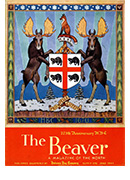
Canada’s History Archive, featuring The Beaver, is now available for your browsing and searching pleasure!

